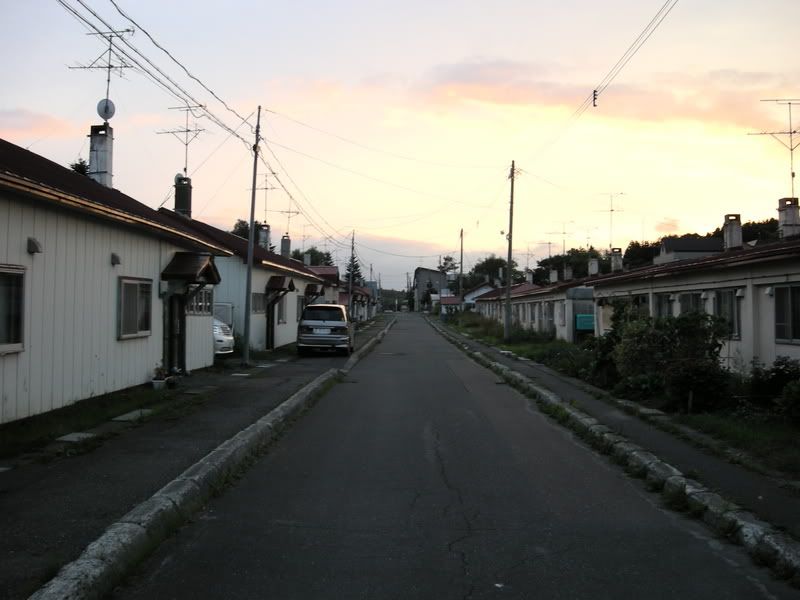A Community Unlike Any Other

Onishibetsu – A side road. One of many. By “many” I mean “four”.
So a month and bit into my embedding with quite possibly one of the most remote villages in Japan, I have begun to realize just how anomalous Sarufutsu strikes my stubbornly cynical South African mentality on just how a community functions. It would appear that everything in this town, from education through to basic civil service, functions as a component which serves more than the obvious purpose. 
The Town Hall. Nexus of all things ideal and cuddly.
For example, every year the area of Sarufutsu have an organized ‘street sweep’, whereby ordinary citizens, not civil servants, make the 5km-odd walk from their homes to a pre-arranged rendezvous (this year it was the Sarufutsu
At the end of the course, the families do not simply bundle into cars and head back home, as I had expected, but rather settle down for a large picnic in the nearby fields, enjoying what is essentially one of the few summer days left before the icy tundra of winter descends. Dodge ball and other games are started, and the parents as well as kids thoroughly enjoy themselves. The smaller kids are the hardest to hit with the ball. The little bastards have watched too much Naruto and thus bob and weave like only a true ninja of Konoha village could achieve.)
So what would have essentially being a mundane civic duty is turned into a fun-walk picnic dodge-ball treasure hunt extravaganza, and serves to foster an even greater community spirit. In South Africa, of course, such a walk would require policemen, the closure of roads, booking of the park and other incentives. I tried to imagine asking anyone in SA to walk 5km collecting trash and came up with a mental image of trash bags measured in tons, not kilograms.

The High School Staff. From nurses to headmaster, all are unfathomably dedicated to their jobs. And eating octopus…
From an education perspective, the school system here appears to have far more financial social motivation to improve. I had gone on what was essential an inventory-taking excursion in the 2nd week of my stay here, and it was quite startling to visit these elementary schools that in South Africa, or indeed most places in the world, could hold hundreds of students, house not tens, but two, three or sometimes five kids! Likewise, each school receives a considerable amount of financial support, as I witnessed these schools receiving government-purchased bicycles, digital cameras and so on. For the larger schools, the stock received each year increases. For my Junior High in Onishibetsu, the largest in the area at a whopping 72 students (in a school which in SA would house easily 500-600 students), items included projector screens, books, dvd players and a curious-looking OHP thing which I was later told projects 3D holographic images of camera photos or general digital media. The obvious response in my head was that such over-expenditure was a needless waste of resources. But after experiencing just how integral school life is in Japan, the resources spent all contribute to making education something the kids can look forward to, or at the least not loathe. Instead of a boring day-long stretch of classes, the kids here truly seem to enjoy their schooling, and often pop into the staff room to chat to the teachers who have no classes at the moment. Indeed, even myself, the resident Gaijin foreigner, replete with mutant features and far too much body hair for Asian standards, is liked almost by default, purely because my presence is simply another fascinating aspect of the school. Simply being here in the classrooms, it seems, is enough…
From the petrol attendant saying ‘herro John-san!’ to the kids in the school asking every conceivable question and then some, the life in Sarufutsu is indeed a homogenous one. To be sure, there must exist some animosity between individuals, as Japanese folks, no matter how polite, are human after all. But as a whole, community life permeates throughout this community like the very air we breathe. An odd sentiment, given my rather grim opinion of humanity in general, but living in this anomalous bubble has shown me that it is possible to achieve some semblance of a decent society.
Of course, the reality of the situation (ie the politics of it all) is that towns like Sarufutsu are dwindling in population. When the viable career options range from fisherman to fireman, the more service industry-minded high school graduates flock to
The result – a damn-near perfect place to grow up, make friends and get lots of fresh air, and a great place to come to spend your last days as a pensioner. For the youth, all the enthusiasm of a community spirit cannot substitute drunken karaoke sprees and the pursuit of a career outside of the timber or fishing industries.

Norris, my resident spider. He too is committed to his job (catching and devouring tasty moths.)